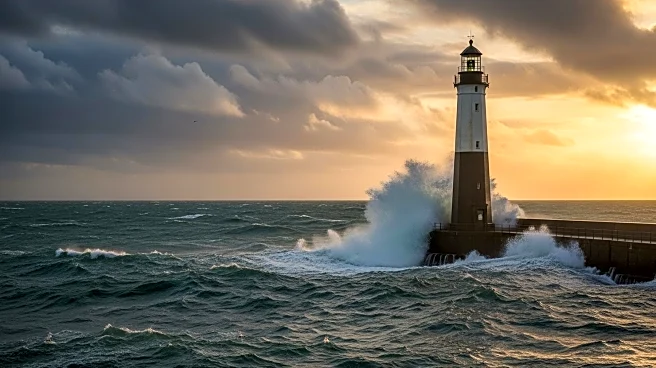What's Happening?
The NGO Sea-Watch has released a report highlighting the violent practices of the Libyan Coast Guard, which is operated by militias. The report details how the Coast Guard intercepts migrants attempting to reach Europe, often using violence during these
operations. Since 2016, approximately 170,000 migrants have been intercepted and returned to Libya, where they face imprisonment and extortion. The European Union funds the Coast Guard's operations, despite reports of violence, including incidents where Coast Guard members fired on NGO rescue vessels. The report was released ahead of a ceremony welcoming Libyan representatives to EU institutions, raising concerns about the EU's continued partnership with the Libyan Coast Guard.
Why It's Important?
The report underscores the ethical and human rights concerns surrounding the EU's partnership with the Libyan Coast Guard. The violent practices reported by Sea-Watch highlight the risks faced by migrants and the potential complicity of the EU in these abuses. This situation poses a challenge to the EU's commitment to human rights and its handling of migration issues. Additionally, the growing influence of Russia in Libya, as noted by EU officials, could further complicate the geopolitical landscape, potentially using migration as a tool to destabilize Europe. The EU's engagement with Libya is crucial in addressing these concerns and preventing further human rights violations.
What's Next?
The EU's continued collaboration with the Libyan Coast Guard may face increased scrutiny from human rights organizations and political leaders. There could be calls for the EU to reassess its funding and support for the Coast Guard, especially in light of the reported violence. The geopolitical implications of Russia's involvement in Libya may prompt the EU to strengthen its diplomatic efforts in the region. Additionally, the EU may need to address the ethical concerns raised by its partnership with Libya, balancing migration control with human rights obligations.
Beyond the Headlines
The report raises broader questions about the EU's migration policies and the ethical implications of outsourcing border control to countries with questionable human rights records. The use of violence by the Libyan Coast Guard highlights the potential for human rights abuses in migration management. This situation may prompt discussions on the need for more transparent and accountable practices in international migration agreements. The EU's approach to migration, particularly in relation to Libya, could influence future policy decisions and international relations.















